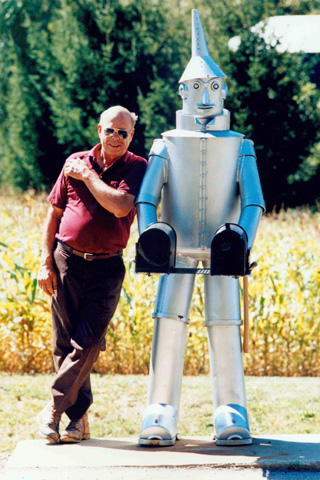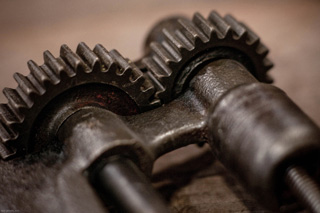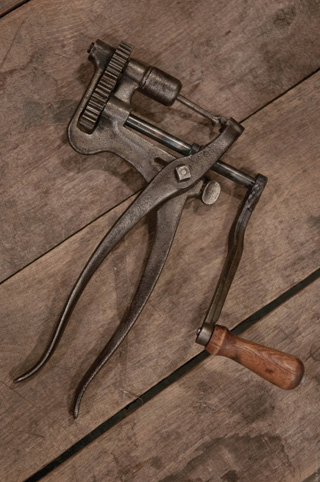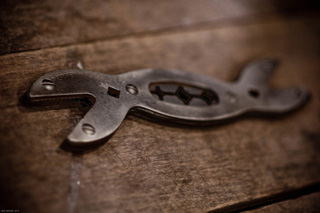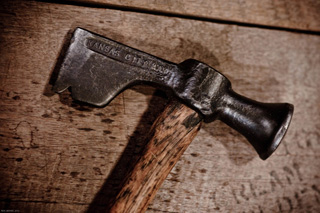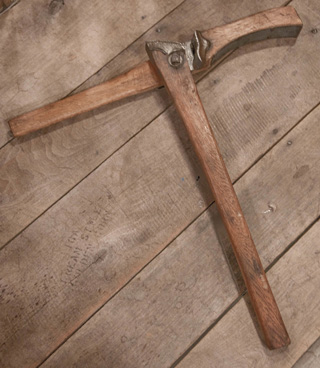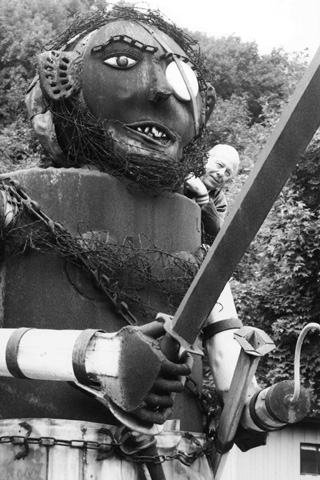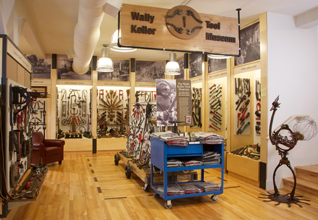
If you’re a vintage tool collector, an aficionado of things forged from iron and steel, or a regular follower of our “Stumpers” department in the print magazine, here’s a vacation destination to put on your bucket list: “The Wally Keller Tool Museum” in Mt. Horeb, Wisconsin. It’s one of the highlights of Duluth Trading Company’s brand-new flagship retail store, just a few minutes’ drive from Madison. The collection consists of more than 3,100 hand tools, many of which pre-date industrialized toolmaking in America. And, they were all collected by Mt. Horeb native Wally Keller over a period of nearly 20 years.
Steve Schlecht, owner of Duluth Trading Company, filled me in a bit on the man he knew as both an artist and a collector — as well as how this substantial tool assemblage found its new home.
As the story goes, Wally Keller was a man of many interests and a jack-of-all-trades. He grew up on a farm during the Great Depression and became handy with tools, helping his father maintain the family’s farm machinery. Later, during the Korean War, Keller enlisted in the Navy and found his way into machinist school right out of boot camp. From there, he used those skills in the machine shop of a destroyer during his time in active duty. After the war, Wally returned to Mt. Horeb and bought a welding shop. In addition to repairing and fabricating parts for anything and everything around the area, Wally began to sell equipment for the dairy industry and eventually became an antique furniture dealer and realtor. According to Schlecht, “there wasn’t a tool he didn’t know how to use or a bygone tool he couldn’t appreciate…He was a guy who definitely knew how to work with his hands.”
Keller began to acquire old hand tools at the auctions he attended. Eventually, they filled the entire lower level of his home.
After retirement, Wally developed a corollary pastime to his career of collecting and using tools: creating metal sculptures — sometimes small enough to hold or as tall as 14 ft. He’d scrounge for old farm machinery, automotive parts and pretty much anything he could buy at auction or acquire cheaply and weld together. “I asked him one time if he drew his sculptures out in advance before making them, but he said that no, he didn’t. They were abstractions in his mind; he’d just start searching for parts to satisfy his vision of a particular sculpture and then build it.”
“He became quite a local folk artist around Mt. Horeb,” Schlecht says. Some of his sculptures are on display here and there around town and in the new store, but most of them are located at Keller’s farm home where Wally’s wife, Shirley, still resides. (Wally died in a tractor-related accident in 2009.)
Just two weeks prior to Keller’s death, Steve visited his home to buy several more pieces of folk art. Schlecht had been collecting it over a period of 12 to 15 years prior to that time. “During the visit, I recall Wally asking me, ‘Steve, have you ever seen my tool collection?'” That first trip down to the Keller basement made an immediate and lasting impression.
“Following Wally’s passing, I wrote to Shirley to see if the tools might be available for sale. As so often happens in these situations, an auction can disperse a family collection like this all over the country forever. I didn’t want to see that happen with Wally’s tools…I had a vision for eventually opening a flagship store in Dane County, and I wanted to create a museum in the store to showcase Wally’s efforts,” Schlecht recalls.
Shirley Keller shared Steve’s interest in keeping the tools together and displayed locally for tool lovers to enjoy. So, all 3,147 pieces became the property of Duluth Trading Company. A portion of the collection, curated by Jim McGee — a fellow tool collector and friend of Wally’s — now occupies a 600-sq.-ft. space in the new store, opened just this month. Schlecht says only about one-third of the collection is currently on exhibit, but plans are to rotate the tools in and out so all of them will eventually be displayed. Some of the collection could go to a second retail store, if the company decides to open one in the future.
In terms of vintage, the tools date from the end of the Civil War through the 1950s and 60s. The store’s museum is subdivided into categories based on tool use. They include blacksmith-made tools (many of which are unique “one-offs”); fuel handling tools; tools for livestock, fencing and firefighting; a collection of 150 different pipe wrenches representing some 180 patents granted between 1870 and 1920; proprietary implement wrenches for both the horse-drawn and early motorized carriage eras; adjustable wrenches and automotive jacks; plus some wooden tools for woodworking.
Steve says Wally’s collection is “heavy” on steel-forged agricultural and automotive tools, versus those with more of a woodworking emphasis. Some of his favorites include a foot-long steel blasting wedge with a hole for black powder. Allegedly, it will reduce even a big tree quickly into fence posts when the explosion occurs. He also appreciates a carved wooden funnel that seems to have been intended for pouring melted wax into candle molds. “We’ve got a fair collection of alligator wrenches, too, which arguably have to be the most profanity-inducing wrenches that ever slipped off a nut — real ‘knuckle busters,’ I like to say.”
For those of you who follow vintage tool brand names, Wally’s collection includes examples from Millers Falls, Stanley, Ohio Tool, Ford Motor Company, John Deere, Moline Plow, Pierce Arrow, Goldblatt Tool and Como Pipe Company, among many others.
The store also displays a special “Whatsis?’” board with 30 hard-to-identify tools that will challenge even a serious tool collector, Schlecht says. (And for those bested by the effort of identifying all or some of them, there’s an answer key right around the corner that solves any riddles. Peek if you must.)
“As a whole, Wally’s collection really speaks to the ingenuity of American toolmaking.
“Our store building was built in 1882; it was Mt. Horeb’s original mercantile and hardware store and then, for a time, a mustard museum. With its old wooden floors, Wally’s collection just feels right to be here in our building, and we’re delighted to share it free of charge with anyone who stops in for a visit,” Steve says.
